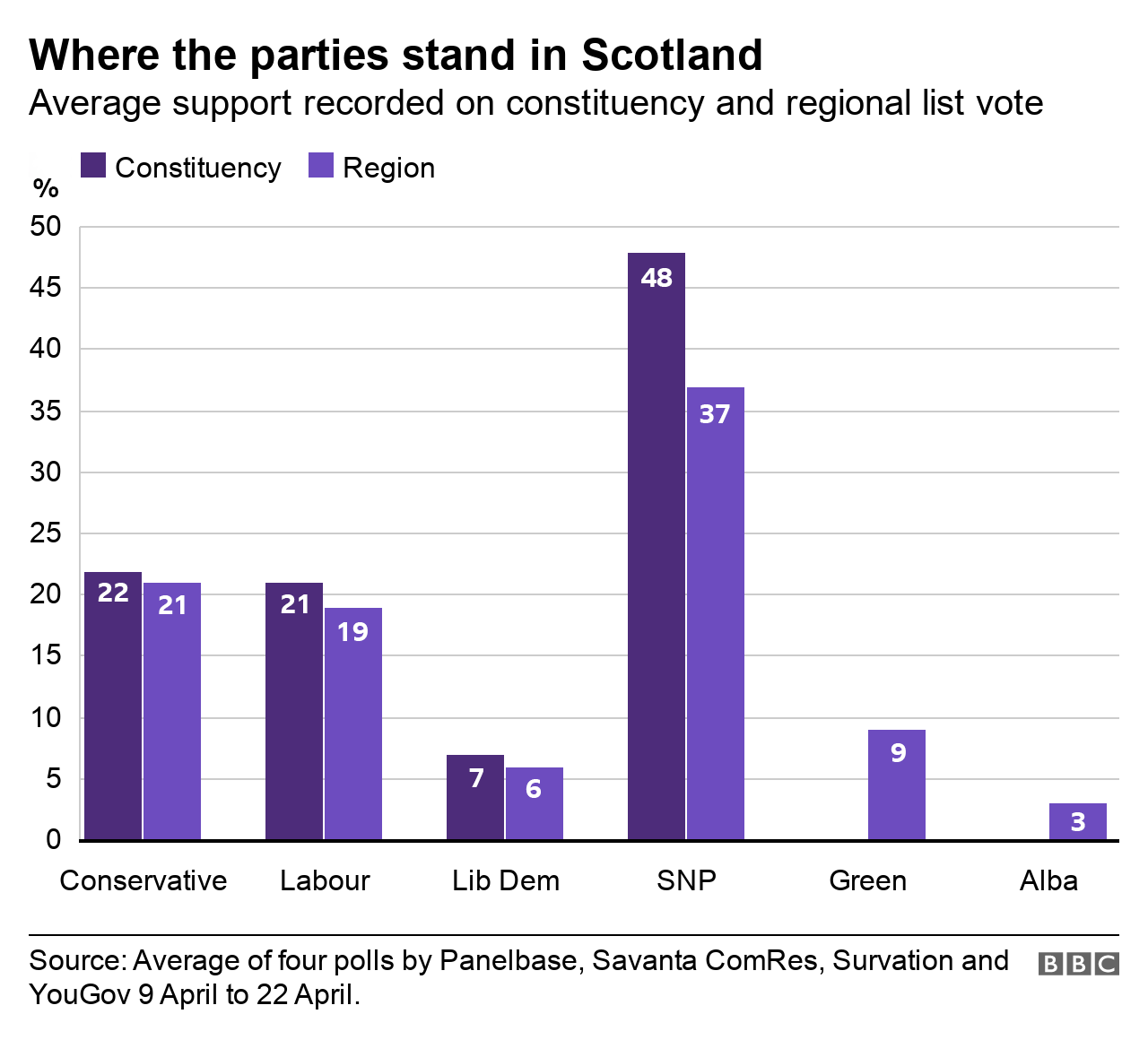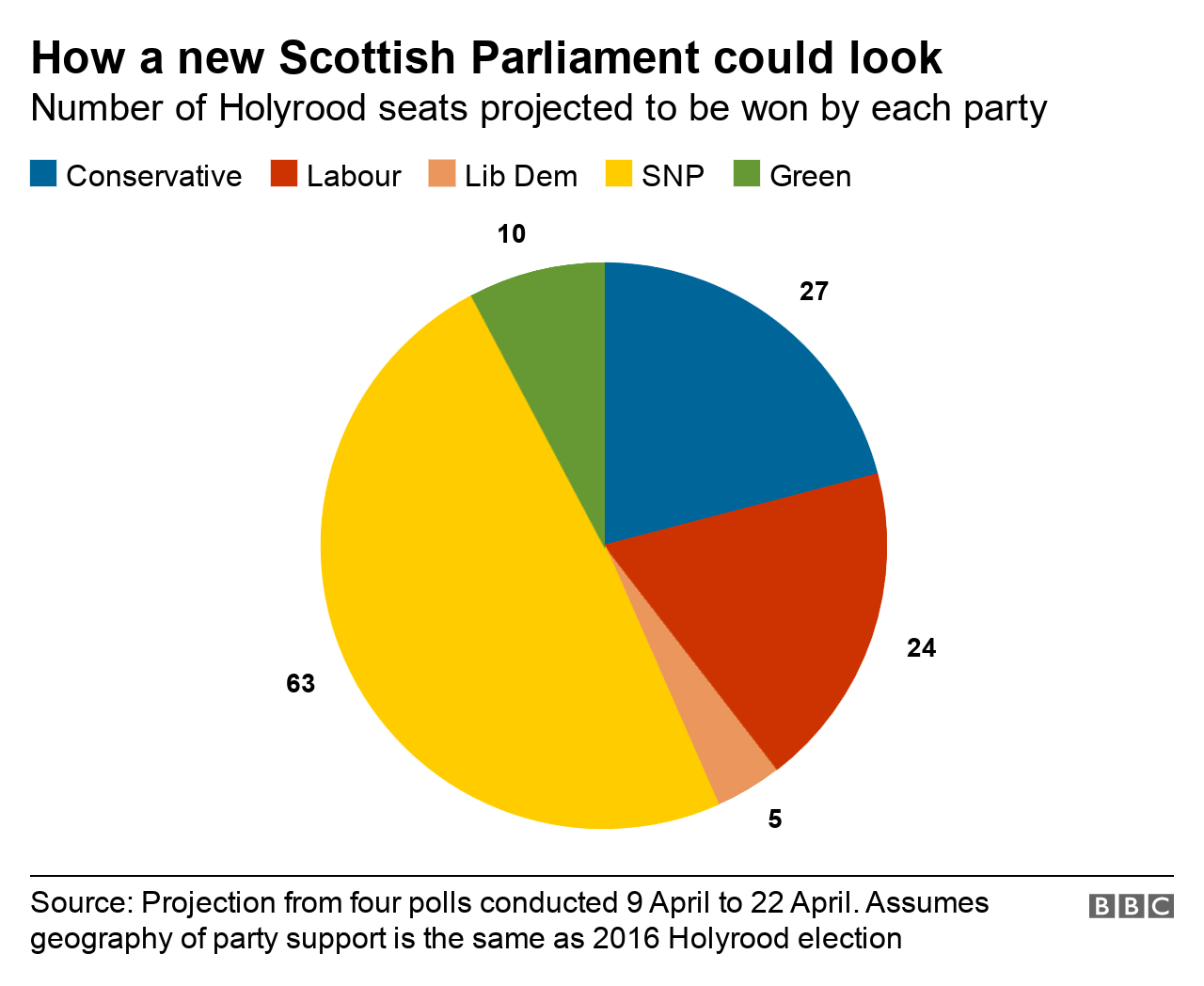Scottish Election 2021: Have the parties lost their momentum?
- Published

There is one thing above all that politicians crave during an election campaign - momentum.
Increased support in the polls provides assurance that their campaign message is going down well and gives them reason to hope that yet more voters might also swing their way.
However, so far at least, none of the main parties has developed any discernible momentum in the Scottish election campaign.
Four polls have been conducted and published over the last 10 days.
True, as compared with the equivalent polls earlier in the campaign, these polls put Labour's vote up on average by a couple of points on both the constituency and the list vote. At the same time, the party's new leader, Anas Sarwar, has made a favourable impression on some voters.
According to YouGov, as many as 39% now feel that he is doing well as Labour's leader, more than twice the proportion who were of that view in March (18%).

At the same time, both Savanta ComRes and Survation say that now more voters regard Mr Sarwar favourably (27% on average) than do so unfavourably (22%).
But a leader's personal popularity does not necessarily translate into votes. Only around two in five of those who think favourably of Mr Sarwar currently say they intend to vote Labour on 6 May. The Labour leader appears to be securing voters' respect rather than their enthusiasm.
As our graph shows, Labour still trail the Conservatives in the battle for second place - and especially so on the list vote.
Apart from Labour, on average no party's support is up by more than a point on either ballot.

How does the Scottish voting system work?
Election 2021: How does Scotland's voting system work?
In the Scottish election people have two votes, one for a constituency MSP (like in the UK general election) and another for the regional ballot, often referred to as the "list vote".
The list vote is usually for a party rather than an individual.
The parties are then allocated a number of MSPs depending on how many votes they receive - once the number of constituencies already won in that region is taken into account - to make the overall result more proportional.
There are eight electoral regions, each with seven regional MSPs.

All four polls have detected a drop in SNP support on the list vote - on average by as much as four points. As a result, there is now an 11-point difference between the party's support on the constituency vote (which has also slipped by a point) and that on the regional list.
Yet there is little sign of any surge in support for Alex Salmond's Alba Party, which is explicitly aiming to garner the support of those backing the SNP in the constituencies.
Three of the four polls put Alba on just 1-3% of the vote, though one, Panelbase, has consistently put the party rather higher at 6%.
Rather, it is the Greens who are proving most successful at picking up SNP support on the list. Around one in seven SNP constituency voters are backing the party with their regional vote.
At 9% the party's average standing in the polls suggests that it could be heading for its best election performance yet.
The gap between SNP support in the constituencies and that on the list means that the party's prospects of winning an overall majority are on a knife-edge.

As the chart above shows, the average numbers in the four latest polls suggest the SNP could be a couple of seats short of an overall majority.
Though much would depend on what happened in a handful of marginal constituencies that the party might - or might not - pick up given its current level of constituency support nationally.
However, if its share of the list vote was three points higher that might be enough to deliver the party the two extra seats it could need for an overall majority.
There may not have been a lot of movement in the polls so far - but even quite small movements between now and next week could make an important difference to the outcome.
John Curtice is Professor of Politics, Strathclyde University, and Senior Research Fellow, ScotCen Social Research.

POLICIES: Who should I vote for?
CANDIDATES: Who can I vote for in my area?
PODLITICAL: Updates from the campaign
